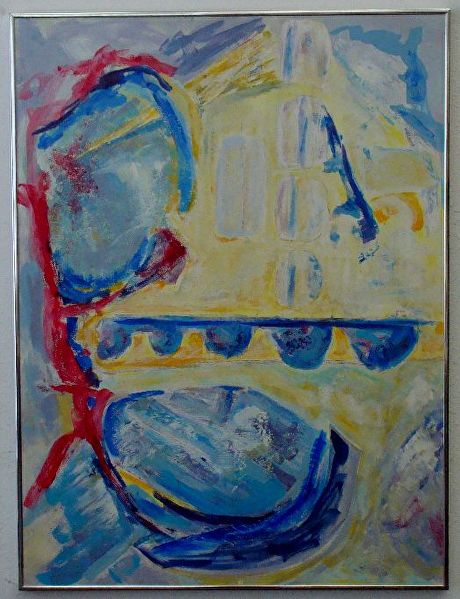
Clarity by Marilynne Eichinger
Our mind tells us that we exist. What of it?
Cogito, Ergo Sum or “I think, therefore I am” is René Descartes’ defining statement on existence. Considered the father of modern philosophy, the 17th-century Frenchman was noted for a mind-body philosophical theory based on scientific observation grounded in experimentation. Skeptical of the dogma spouted by religious authorities and earlier philosophers, his quest was to find truth. As a scientist and mathematician, he searched for “perfect knowledge.” That meant finding answers that would leave no room for doubt.
Most of us view the human body as flesh, bones, organs, nerves, muscles, and blood. If you walk into a wall and bang your head, you feel the pain of hitting a solid, unmoving object. When scientists think of human cells, however, they imagine water and protein molecules that are a collection of vibrating atoms under an electron microscope. Since atoms also make up the wall you hit, theoretically, you should be able to pass between them.
Though Descartes could doubt the existence of a physical body, he couldn’t doubt that he could think. He is credited for inspiring The Enlightenment, an era that embraced the belief that people could be improved by rational change. Descartes relied on reason to test the truth of what people said.
Does this mean anything more than knowing your brain confirms your existence? Or does it make you wonder what type of existence the brain will conjure for you next? Thoughts pigeonhole us and can render us helpless. It is easier to be classified, eliminating the worry of finding a Mr. Hyde beneath the surface instead of the Dr. Jekyll we profess to know. We trap ourselves into thinking a single trait or activity is the essence of our personality. Examining and sharing your complex inner nature with the outside world takes courage.
Not questioning the labels attached to you by yourself or others can handicap you. He’s a gay teacher; watch the kids. She’s an assembly-line worker and never thinks for herself. He’s smart because he’s Asian. Of course, she has a bad temper; she’s a redhead. He’s a millionaire, so he must know the best person to vote for.
It’s also common to define people by their profession. For some, that becomes such an important definition they don’t develop other interests. I’ve met many people like that who face difficulties when retired. Feeling unappreciated, they become bored and go about their days without purpose. Young adults feel at loose ends when they can’t find work in their chosen field of study. A football athlete, I knew, had to give up the sport due to an injury. With his dream of turning pro shattered, the twenty-one-year-old shot himself on the field behind his dorm.
During a recent commencement talk, a College president in China advised the graduating class: “You must not aim too high or be picky about work.” With one-fifth of China’s youth out of work, he spouted China’s economic and political policy to young people, telling them to”suck it up.” In our country where job loss is increasing due to AI and robotics, it is time to stop defining people by what they do for a living. We are not in the Middle Ages, where men with Carpenter for a last name worked with wood.
“I think, therefore I am.” I read more into the phrase than my existence when acknowledging that it’s my mind that defines what I think about myself and my environment. It’s thought processes, not employment, that turn us into who we are. It is possible to do a routine job yet find meaning in bird watching, cooking, hiking, or teaching a child to swim. It is your mind, with its thoughts, emotions, and values, that makes you unique. It can make you energetic and able to glean beauty and pleasure from your surroundings or push you to depression, where you are bored and mired in ugliness.
Take a moment to think about how you define yourself. Is it a true representation? The certainty of the truth depends on how you think about it, Descartes reminds us. When you believe in your multiple abilities, you can plow through foot-deep mud and keep going as some attendees did at last week’s Burning Man event in the Nevada Playa. For them, it was an awesome, though challenging experience. Their thoughts looked for meaning in the generosity of their neighbors and the creative way they entertained each other in the rain. Other minds focused on how miserable it was. Their fear and anger made their existence torturous. It is difficult to adapt if your thoughts turn sour.
Last week, I was engrossed in a Netflix Korean mini-series about a seventy-year-old retired postal worker who, to his family’s horror, wanted to be a ballet dancer. It was a dream put on hold since he was eight. Though his family frowned at his ambition, he went for it, thinking, “What am I waiting for? I’ll only live once.” Believing he could do it, the elder practiced ballet moves and observed younger dancers preparing for performances. He existed. Spurred by passion, his days were filled with pleasure. By acting on his thoughts, he showed an unknown part of himself to the rest of the world–and it was good.
Do comment on my website at www.eichingerfineart.com/blog
Art is always for sale. Clarity is a framed, 48” x 36” acrylic on canvas painting available for $795. Shipped free in the continental U.S. For information, contact me at marilynne@eichingerfineart.com
References:
Hu, R (2023). The jobs data China doesn’t want people to see. Opinion Today. retrieved from https://mail.google.com/mail/u/0/#inbox/FMfcgzGtwznFlMFZLtGpJJnbghFMJPlg
Ashcroft, R. (2022) What Does “ I Think, Therefore I Am” Really Mean? The Collector. retrieved from https://www.thecollector.com/what-does-i-think-therefore-i-am-mean/
